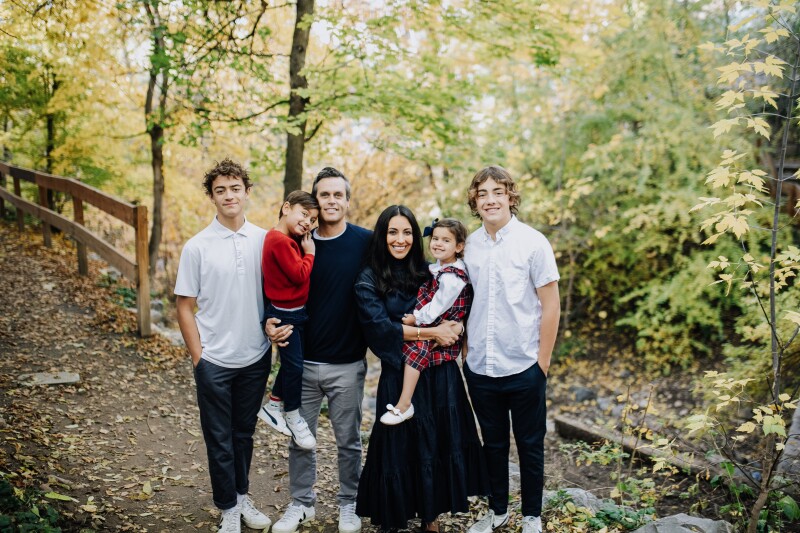When she was a little girl in Iran, Shima Baughman’s mother was imprisoned for her political activism. Baughman has made it her mission to "remember them that are in bonds" (Hebrews 13:3).
Baughman’s mother was Muslim, and she wanted to have the ability to practice her religion by wearing a hijab. So she worked to oust the Shah—a feat she and other activists accomplished in 1979. But the next leader of Iran, Ayatollah Khomeini came into power and took the opposite approach—forcing people to veil and hijab and making converting from Islam a punishable crime by death. In her efforts to fight for democracy, Baughman’s mother was imprisoned with a 10-year sentence. She was miraculously released two and a half years into her sentence, and shortly thereafter Baughman and her family immigrated to the United States when she was 7 years old.
The little girl who immigrated from Iran would go on to become a national expert on bail and pretrial prediction, working to create policy reform for those imprisoned. On this week’s All In podcast, Baughman was asked how her mom’s incarceration has influenced her career.
Listen to the full interview in the player below or by clicking here. You can also read a full transcript of the interview here.
The following excerpt has been edited for clarity.
Morgan Jones Pearson: How does the fact that your mom was once incarcerated influence the work that you’ve done and the compassion that you have for those who are in that situation?
Shima Baughman: Absolutely. It’s had a profound impact because I know that some people are incarcerated unfairly. And I have empathy for people and families of those who are incarcerated, regardless of why, because I know it takes a toll. And with my mother’s example of fighting for policy change and this profound pressure of feeling that God miraculously saved us and brought us to this land of opportunity, I really felt that I needed to show Heavenly Father that I recognized His hand in bringing us to this land. I didn’t want to waste my opportunity in America to give back, to try to contribute in this small way, after all the blessings I'd received.
So I decided I wanted to work in criminal justice policy and help those that were at the bottom of the social hierarchy that might feel shame or feel forgotten. And I remember my first case—you’ll love this because it ties back to my mom—but my first big case after my clerkship was with a prisoner. He was a Jewish rabbi, it was in 2006. And he was prohibited from praying at the right times in a clean place. So he was stuck praying in the cell but because the prison cells have toilets in them, they’re unclean, according to Jewish law. And so he wasn’t able to pray. And I just remember feeling the Spirit so strongly, you know when you’re doing something, you’re just like, ‘I know, this is right,’ I felt that every time I went to that prison and saw him. I was like, ‘This feels right, I should be here,’ helping this man of faith to try to get an accommodation to be able to practice his religion.’ Because, again, it took me full circle to my mom’s own experience with trying to fight for religious freedom.
Becoming a Christian was a huge piece of it, with my mom converting and then us converting his children and learning to be good disciples of Christ. It really kind of gave us more compassion for those that were incarcerated. The Savior specifically mentioned visiting people in prison, right? Of all the things there’s not a ton that we have the Savior said, but he mentioned that. In Isaiah, talking about the Lord says that he will open the prison for those who are bound. In Psalms, it says that the Lord will set prisoners free. I don’t believe that Christ will only liberate those spiritually in prison. Sometimes I do think that He will also liberate those who are physically imprisoned and who want to follow Him. And I think we all need His grace to forgive us and I think sometimes the harsh treatment that we have of those who have committed crimes might have something to do with our inability to see sins in ourselves. Those thoughts and thinking about Christ and [how] He Himself was convicted and sentenced to die, like so many great prophets were. You think of Paul, Abinadi, Nephi, and Lehi in the Book of Mormon, Alma the Younger, Amulek, Joseph Smith, so many great people have been incarcerated. And Moses killed a man, right?! Then repented, saw God, became one of the greatest prophets, and was able to help Joseph Smith restore the gospel. So I just think there's a real tie between becoming a Christian and people that are incarcerated—the least among us. I’ve felt that pull to help those people.

